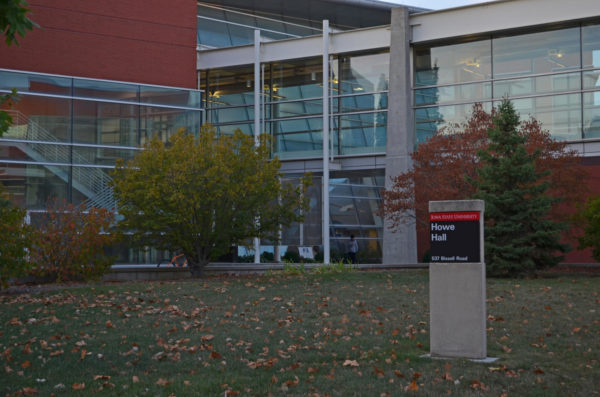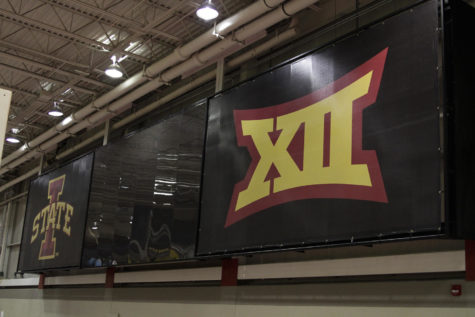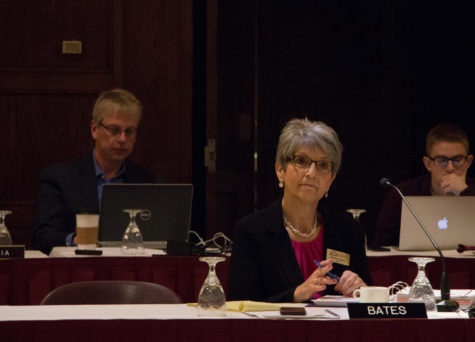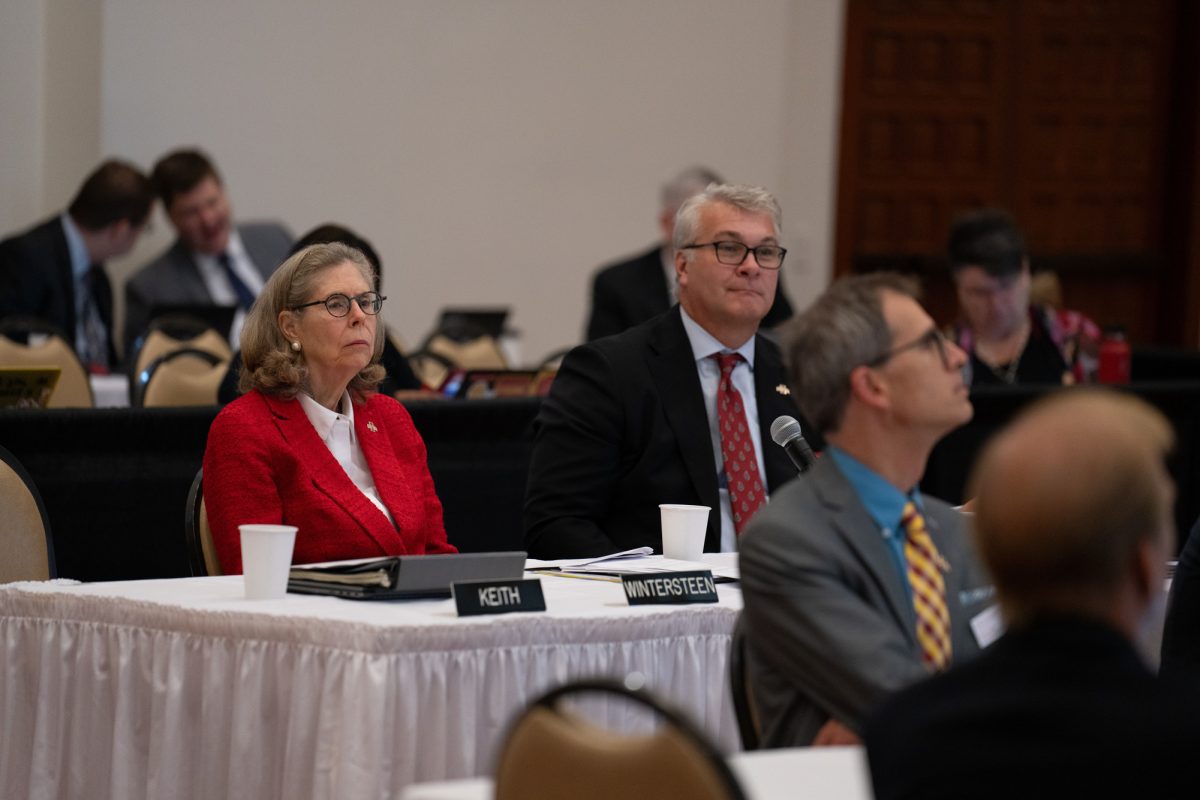The Board of Regents approved an applied statistics master’s program, a degree that was developed with an “enormous and growing demand for statisticians and data science professionals” in mind, according to regents documents.
“This proposed program is focused on more practical applications of statistical methods and analysis and is intended to prepare students, who in the target audience, would really be practitioners, or even out in the workforce, to be effective and ethical users of statistical methods and techniques,” said Senior Vice President and Provost Jonathan Wickert, emphasizing employment growth in the field.
The program is set to begin in spring 2025.
“We really feel that this program sort of fits in the pocket of an established strength at Iowa State in statistics, with the applications to computer science, business analytics, mathematics, actuarial science, digital ag, even artificial intelligence initiatives,” Wickert said.
The program is designed to teach students data-driven problems with statistical methods in a variety of fields, with the goal of students being able to successfully complete a work experience in statistics, according to regents documents.
The program has 23 online credits and 30 credits in total, seven of which would be new. The program would take students 15 months to complete.
Wickert said the university currently has enough staff to start the major and said If the program grows at its forecasted size, there could be up to three new faculty added to the department of statistics, who would also contribute to areas outside of the master’s program.
The degree would be housed in the College of Liberal Arts and Sciences and would be funded by student tuition, which, according to regent documents, would generate more in revenue than it would incur in expenses by the fourth year.
Wickert said the program would start with an initial cohort and grow, expecting 60 students by year six.
Vet med addition
Iowa State submitted a request, which the board approved, for permission to proceed with project planning to expand the Lloyd Veterinary Medical Center Large Animal Hospital.
The expansion will be more than 17,000 square feet and cost up to $12 million, funded by private giving and university funds.
The expansion will “increase large animal reproductive services in response to the growing equine community in the state of Iowa,” according to regent documents. “It would enhance professional student and resident training in advanced equine sports medicine and large animal reproductive services.”
The addition will also support the growth of university activity in theriogenology, the diseases and physiology of animal reproductive systems.
Extreme weather simulators
Iowa State received permission to proceed with project planning for a National Testing Facility for Enhancing Wind Resiliency for Infrastructure in Tornado-Downburst-Gust Front Events (NEWRITE).
The first of the two facilities, a prototype, will be built in Howe Hall.

A second facility, phase 2, would be twenty times the size of the Howe Hall facility and estimated to be approximately 500 feet long at a location still to be determined. The facility would be full-scale and capable of testing structures larger than a single-family house.
The two facilities will “have the potential to attract researchers from around the world to engage with students, faculty and staff involved with non-synoptic wind (NSW) hazard research,” as well as undergraduate, graduate and postdoctoral students.
“Both facilities would provide extensive educational and outreach opportunities, attracting and retaining a diverse pool of undergraduate, graduate and postdoctoral students,” regents documents state.
The project will be funded by National Science Foundation (NSF) grants as a total estimated around $83 million to $94 million.
The National Science Foundation has funded the design and construction of phase 1, including the design, construction and part of phase 2’s design. The funding also would be earmarked for research, protocol development and facility criteria development, if permission is granted by the board.
Phase 2 would not proceed until successfully being awarded funding through NSF’s competitive award process.
Video board approval
The board also approved new video boards and sound systems for Hilton Coliseum and Jack Trice Stadium, as well as the Cyclone Sports Complex and Lied Recreation Center. The athletic department estimated the projects would be done at varying times, with Hilton done in fall 2024 and Jack Trice stadium done in fall 2025.

Interim Senior Vice President for Operations and Finance Heather Paris presented the board with the proposal, saying all the video boards and sound systems were most recently installed between 2006 and 2012. However, regent documents indicate Jack Trice video boards, except the north video board, were installed in 2015, and the Hilton Coliseum sound system was installed in 2016.
The projects are not expected to exceed $16 million and will be financed through a master lease program, repaid by athletic department gifts and revenues over a period no longer than ten years.
Updates
Iowa State remains the highest-offering regent institution in the percentage of its courses offered through distance learning.
Iowa State offered 1,710 courses through distance education delivery in the 2022-2023 year.
Iowa State introduced one new online or distance program during 2022-2023, and it was a certificate in early childhood and family policy.
Total credit hours offered online across the three regents institutions nearly doubled at the start of the COVID-19 pandemic and has since dropped from that peak, yet remains nearly 30% higher than pre-pandemic levels.
The updated five-year institutional roads program report indicated Iowa State would receive funding for a new traffic signal at University Boulevard and 6th Street in the 2024 calendar year.
The report also indicated over the next five years funding would be allocated toward the reconstruction of 13th Street and Haber Road east to the Iowa State property limit.

The board elected Sherry Bates as the new board president, replacing Michael Richards, who stepped down as president in January and will leave the board entirely in April. Bates, nominated for the post by Richards, will serve until April 30, when another election will occur to fill the role for two years.
Bates previously served as president pro-tem, and that position was filled by Greta Rouse, who will also serve in the role until April 30.
Iowa State Bioinformatics and Computational Biology will explore if students are better served with concentration areas in other stable STEM majors due to low enrollment. Additionally, veterinary sciences has a 95% employment rate and is planning to start an equine rehabilitation program.
These findings are part of the presentation of reports on academic program reviews, required for each major every seven years and consist of a self-study and external review.
A change resulting in Gov. Kim Reynolds’ state government reorganization efforts, the Iowa Braille and Sight Saving School, Iowa School for the Deaf, are no longer under the watch of the Board of Regents. Policies in the board’s policy manual for the Iowa Braille and Sight Saving School, Iowa School for the Deaf and Iowa Public Radio were struck from the board policy manual.
“Effective July 1, 2023, governance over the special schools was transferred from the Board of Regents to the Iowa Department of Education, rendering these policy manual provisions obsolete,” Board Counsel Aimee Claeys said.
The regents heard reports from the office of the provost regarding academic integrity and how it is monitored and addressed, especially in research.




















